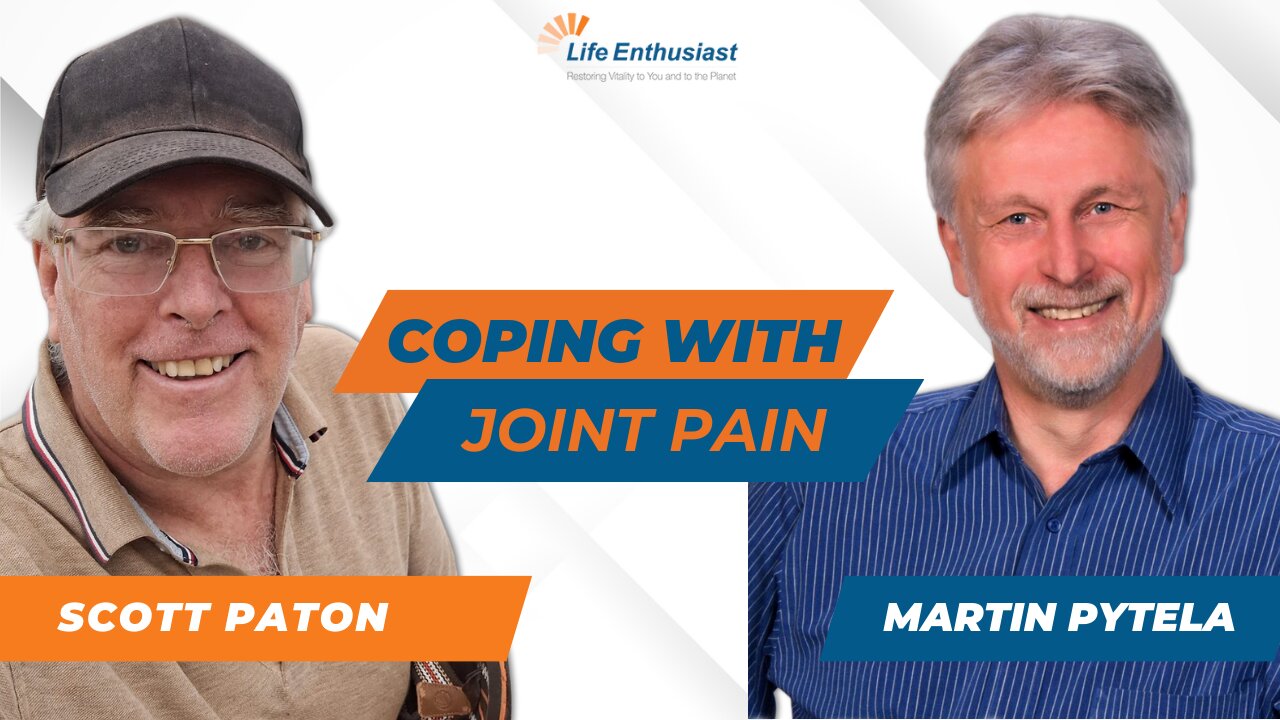Premium Only Content

Coping with Joint Pain: The Role of Stress, Diet, and Lifestyle
In this episode of Life Enthusiast, Martin Pytela and Scott Paton dive into the intricate relationship between stress and joint pain, exploring the various facets that contribute to chronic discomfort. Discover practical tips and insights for addressing these issues holistically.
Highlights from this video include:
The connection between dietary choices, such as eliminating grains and nightshades, and joint pain relief.
Understanding how emotions like grief and stress can impact physical health.
The pitfalls of relying on medication like low-dose naltrexone and Aleve for joint pain.
The importance of keeping a food diary to identify dietary triggers.
The adverse effects of constant exposure to stressful media and how to mitigate them.
Join us as we explore comprehensive strategies that can help you regain control of your health!
Topics Covered:
Stress and Joint Pain
Martin and Scott discuss the link between stress and joint pain, emphasizing that stress can be a trigger that leads to chronic pain. They mention that many people in support groups, like those for fibromyalgia, frequently note stress as a major factor contributing to their discomfort.
Diet and Inflammation
The hosts highlight the importance of diet in managing joint pain. They discuss eliminating high-starch foods and grains, which can cause metabolic damage and inflammation. They also touch upon the impact of nightshades (e.g., potatoes, tomatoes) on joint pain, suggesting people try eliminating these for a period to see if symptoms improve.
Emotional and Psychological Impact
Martin discusses how grief and emotional trauma can exacerbate stress and, by extension, physical pain. The body's response to imagined or real stressors can be similar, making it important to manage emotional health to alleviate physical symptoms.
Detoxification and Movement
They emphasize the importance of detoxifying the body and promoting movement to manage pain and improve overall health. Regular exercise, efficient bowel movements, proper hydration, and breathing are essential for reducing stagnation and promoting the body's natural detox processes.
Holistic Health Approach
Instead of seeking a single solution, the episode underscores the need for a holistic approach to health. Addressing multiple factors—nutrition, emotional wellbeing, physical activity, and detoxification—is crucial for long-term relief from joint pain and improving overall health. They also caution against relying solely on medications like low-dose naltrexone (LDN) or painkillers like Aleve, which might provide temporary relief but have long-term side effects.
Questions Covered in this Episode:
Martin compares the approach to health with fixing a car. What are the essential components he suggests we need to focus on for optimal health?
Scott mentions that people seek a singular solution for their ailments. Do you agree that addressing health issues requires a broader, multi-faceted approach? Why or why not?
What are some dietary changes proposed in the video that could help reduce joint pain? How might these changes impact overall health?
How does grief and stress relate to physical symptoms like joint pain, as mentioned by Martin and Scott?
Martin talks about the impact of visualizing stressful scenarios as being similar to actually experiencing them. Can you think of examples from your own life where your body reacted to imagined stress?
What are nightshade plants, and why might they contribute to joint pain? How would you incorporate or eliminate them in a diet plan to test this theory?
How does Scott suggest we can use food diaries or journals to track the impact of diet on our health? Do you think this method is practical or effective?
According to Martin and Scott, why might continuous consumption of stress-inducing media (like horror movies or intense TV shows) contribute to health problems?
What are the potential dangers of relying on medications like low-dose naltrexone (LDN) or Aleve to manage chronic pain, according to the discussion?
In the context of this episode, what are the four pillars of health (toxicities, malnutrition, stagnation, and trauma) and how can they each be addressed for better health outcomes?
Fun Facts about this Episode:
Foods to Avoid for Joint Pain:
Martin Pytela mentions that foods from the nightshade family, like potatoes, tomatoes, bell peppers, and eggplants, are often problematic for people with joint pain. Eliminating these from your diet for three months might help reduce pain.
Impact of Stress and Emotions on Physical Health:
Your body reacts to stress and intense emotions as if they are real physical threats. Whether you're watching a stressful movie or visualizing a stressful event, your body can produce a similar response, potentially impacting your physical health, including joint pain.
Diet and Metabolism:
High-starch diets, which convert to high glucose levels, can lead to metabolic damage. Consuming slower-burning foods like proteins and fats is better for metabolic health.
Low Dose Naltrexone (LDN):
Low dose naltrexone is used to manage pain by keeping the immune system occupied, thereby reducing its attack on other body parts. Nevertheless, it is a low-level toxic substance, primarily used for drug addicts, and might have long-term side effects.
Entertainment and Mental Health:
Watching intense movies or playing violent video games can stress your adrenals, similar to real-life stresses. Martin Pytela shared how even popular movies like "The Lord of The Rings" can be too stressful to watch due to their intense scenes.
Experimenting with Diet Changes:
In the context of eliminating certain foods, Scott Paton suggests keeping a food diary to track what you're eating and how it affects your health. This way, you can experiment with removing and adding different foods to see their effects over time.
-
 LIVE
LIVE
Matt Kohrs
8 hours agoMarket Open: New Highs or Bust?! || Live Trading Futures & Options
855 watching -
 LIVE
LIVE
Randi Hipper
18 minutes agoWALL STREET'S CRYPTO BET REVEALED! HINT: IT'S NOT BITCOIN!
16 watching -
 LIVE
LIVE
The Mike Schwartz Show
53 minutes agoTHE MIKE SCHWARTZ SHOW with DR. MICHAEL J SCHWARTZ 08-28-2025
120 watching -
 LIVE
LIVE
VINCE
1 hour agoTragedy In Minneapolis | Episode 113 - 08/28/25
18,343 watching -
 LIVE
LIVE
LFA TV
2 hours agoLFA TV ALL DAY STREAM - THURSDAY 8/28/25
6,327 watching -
 2:04:35
2:04:35
Game On!
19 hours ago $2.59 earnedCollege Football Is BACK! Week 1 Preview!
27.7K1 -

The Bubba Army
1 day agoMinneapolis Shooter Story Unfolds! - Bubba the Love Sponge® Show | 8/28/25
58.2K8 -
 LIVE
LIVE
JuicyJohns
1 hour ago $0.11 earned🟢#1 REBIRTH PLAYER 10.2+ KD🟢
43 watching -
 LIVE
LIVE
GritsGG
1 hour agoWin Streaking! Most Wins 3485+ 🧠
105 watching -
 16:58
16:58
marcushouse
14 hours ago $3.98 earnedSpaceX Starship Flight 10: What Really Happened! 🚀
47.7K13